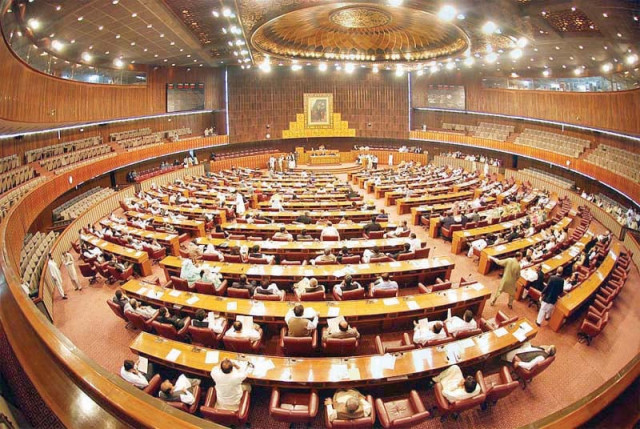Ongoing debate: Presidential system can’t be enforced by parliament
Legal experts say move can’t be done even through a constitutional amendment

The presidential system could not be enforced in the country even through a constitutional amendment by parliament, believe several legal experts.
An intensive debate is going on social media on the enforcement of presidential system these days.
Earlier, a similar debate was started when three separate petitions were moved in the apex court seeking a presidential form of government in the country.
The first constitutional petition was filed by Tahir Aziz Khan, the chairman of the Hum Awam Pakistan – a little-known political party -- under Article 184 (3) of the Constitution.
The petitioner had requested the apex court to issue directions to the prime minister to hold a referendum for setting up a presidential form of government.
The second petition was filed by a citizen of Islamabad, Dr Sadiq Ali. The third plea was moved by former lawmaker, Ahmed Raza Kasuri.
In September last year, a three-judge bench of the apex court, led by Justice Umar Ata Bandial while upholding the SC Registrar office’s objections, had rejected these petitions.
Also read: Gossip about presidential system raises eyebrows
During the hearing of case, the Justice Bandial had observed that the presidential system had always harmed the country. However, he had added that the court might have entertained the plea had a political party approached it on the issue.
"If the petitioners want to start a movement [for a presidential system], then they can go ahead and do that," he had noted, adding that the SC did not have the authority to abolish a system and bring another one.
Senior lawyers believe that the move to introduce a presidential system in the country might be shot down by the apex court, which has already declared that the salient features of the Constitution could not be amended and the parliamentary form of government was among them.
In 2015, the majority of Supreme Court judges – while hearing the 21st Constitutional Amendment case – had held that the parliamentary form of government was one of the salient features of the Constitution which could not be amended through a constitutional amendment.
Justice Sheikh Azmat Saeed had authored the verdict which had been endorsed by eight judges.
Interestingly, four sitting SC judges -- Chief Justice of Pakistan Gulzar Ahmed, Justice Mushir Alam, Justice Bandial and Justice Maqbool Baqar – were signatories to this ruling.
Also read: Rally held in favour of presidential form of govt in Pakistan
According to the verdict, the Constitution contained a scheme reflecting its salient features.
“In an effort to discover such salient features, material outside the Constitution cannot be safely relied upon. The salient features are ascertainable from the Constitution including democracy, the parliamentary form of government and independence of the judiciary,” it had read.
It had further stated that the powers of parliament to amend the Constitution were subject to implied limitations.
“Parliament, in view of Articles 238 and 239, is vested with the power to amend the Constitution as long as the salient features of the Constitution are not repealed, abrogated or substantively altered.”
The verdict had also noted that the apex court was vested with the jurisdiction to interpret the Constitution in order to ascertain and identify its defining salient features.
“It is equally vested with jurisdiction to examine the vires of any constitutional amendment so as to determine whether any of the salient features of the Constitution have been repealed, abrogated or substantively altered.”
Also read: SC dismisses pleas on presidential system
Some legal experts believe that the verdict would be a hurdle in the way of those seeking to introduce a presidential system in the country as it was still in field.
However, one section of lawyers believes that the court’s verdict was a conflicting one.
“It says democracy is a salient feature of the Constitution but also declares that the parliamentary system is also a salient feature of the Constitution,” said a legal expert.
“In a democracy, people have the option to choose what kind of system they want to adopt for governance,” he added.
The Pakistan Bar Council and major political parties especially the PPP are expected to resist any move to impose a presidential system.
Barrister Asad Rahim said the debate was pointless as a presidential system was legally “impermissible”.
"The parliamentary form of government has been held to be a salient feature of the Constitution by the Supreme Court in Mahmud Achakzai’s case in 1997 and the more recent judgment in the District Bar Association Rawalpindi case,” he pointed out.
Also read: Parliament cannot take ‘direction’ on legislation
“It follows that the parliamentary form of government cannot be supplanted by the presidential system even through a constitutional amendment,” he added.
PTI lawyer Chaudhry Faisal Hussain said the presidential system had already lost half of the country, referring to the fall of Dhaka in 1971.
He added that there was a need to consider every aspect before debating on the presidential system.
Advocate Faisal Siddiqi believes that the presidential system requires a new constitution.
“Even a constitutional amendment cannot abolish the parliamentary system,” he added.
He further said only a “constituent assembly” could enforce a presidential system in the country.
Senior lawyers say that as long as the SC judgment is in field, a presidential system cannot be enforced in the country.



















COMMENTS
Comments are moderated and generally will be posted if they are on-topic and not abusive.
For more information, please see our Comments FAQ